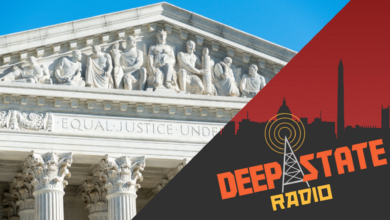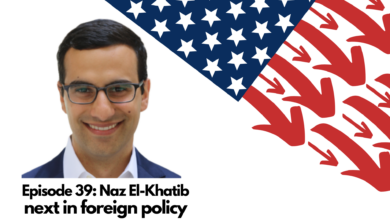
DSR Brief 1 (Jeffrey Lewis)
This is one of Deep State Radios briefs and debriefs.
David Rothkopf: Hello, I\’m your host David Rothkopf and this is a Deep State Radio briefs and debriefs. These are a series of shorter podcasts that will take us into a specific area and drill down with one of our expert guests. Today\’s expert guest is Jeffrey Lewis, who is the author of the 2020 Commission Report on the North Korean Nuclear Attacks against the United States and is one of the leading nuclear weapons experts in the United States of America. You may have heard him on our Monday podcast in which we talked about the new book, but Jeff what I\’d like to do today in in this discussion is is just get your sense of where we are with North Korea because, there seem to be multiple conflicting narratives those the president\’s narrative, which is Kim Jong Un likes me which sort of sums up his the totality of what matters to him. There\’s Mike Pompeo the Secretary of State\’s narrative, which is we are talking to the North Koreans. Although that hasn\’t been going terribly well, there\’s a narrative from North Korea which is kind of a public narrative in which they brushed off Pompeo, um, but say flattering things to Donald Trump, but then they have a private narrative, which is they\’re going along with their nuclear weapons program and according to one report have assembled five or six more nuclear weapons in the time that we\’ve been having this discussion and seem to be growing as a threat even as we\’re talking about whether the president\’s initiative is working or not. I just what I really like to do is you know get your thoughts get our give our listeners out there in deep State radio land your thoughts on where we are and what the big turning points in the next couple of months are.
Jeffrey Lewis: Yeah, well, I I think that all of those narratives are in some way true and that\’s kind of the interesting feature of the situation. You know, I think it makes sense to start with the North Koreans because I think the North Koreans have been kind of the most straightforward of the bunch. Which is that the North Koreans want to keep their nuclear weapons, but they want to reduce their isolation. And so with the North Koreans are offering I think is not not to give up their nuclear weapons, but to stop making such a big deal out of them, you know, not test them not parade them and in exchange, they\’re expecting that the relationship that they have with the United States will improve the relationship they have a South Korea will improve and that Russia and China will stop enforcing sanctions. And actually I think they\’re mostly right about that. I mean the the Moon administration\’s I\’ve Korea\’s he was pretty eager to improve relations Russia and China have stopped enforcing sanctions.
And then you have the United States where while I think much of the administration is not on board with this deal. They they\’re actually expecting North Korea to give up the nuclear weapons or we go back to pressure the president seems to feel differently and I think the North Koreans have figured that out.
I think North Koreans have figured out that is long as they flatter the president and and and deliver the kind of photo ops that he likes and he doesn\’t care much about actual disarmament and you\’re the famous example of that is when a North Korean official was getting pressed by Mike Pompeo about making a firm commitment on giving up the weapons and North Korean official wave to cellphone and Pompey was face and told him to call Trump.
So I think that\’s where we are. I think the North Koreans aren\’t giving up the bomb and that\’s fine with everyone except Washington, but it is fine with the president and that puts all of the discussion back on us in DC. You know. Wow, what how does that process play out?
David Rothkopf: So but so is their North Korean endgame here or is this just the new normal is to North Korea going to placate Trump while Trump\’s around you know, and you know name a street in Pyongyang after him or do whatever they need to do to keep him happy and bright perhaps, you know, intersecting Dennis Rodman Street or something that you know is a highlight of downtown Pyongyang and just keep making new weapons and and building new capabilities as far as they can take it?
Jeffrey Lewis: Works for India works for Israel. I think that I think that\’s what the North Koreans think the North Koreans think that there is they can keep the weapons and that they have to agree to some kind of modus vivendi with the administration and they think they\’ve concluded and then I think they\’re right about this that what Trump doesn\’t want is the embarrassment of the tests and he likes in a positive way the pageantry of the summits so I think for the time being they\’re going to keep building nuclear weapons while avoiding testing them and giving the president the you know pageantry he desires.
The that I think they think that can go on forever because it goes on forever for some countries. Obviously. I am concerned that it\’s not sustainable, you know president Moon won\’t be president of South Korea forever. Eventually a conservative will win an election there president Trump won\’t be president forever and even if he thinks he might be president forever. He also might change his mind. So I understand the North Korean play. I just I wonder I wonder how long it can last.
David Rothkopf: Yeah, that\’s you know, it\’s kind of scary to think that where we are right now with the North Koreans much as where we are with others in the world is that the Trump administration\’s red line is embarrassing the president. And if you don\’t embarrass the president then you can do almost anything and if you flatter the president while not embarrassing the president you actually can do anything and that it is the countries that make him look bad who end up running afoul of of Trump or countries that have made a mistake of being associated with an Obama policy because I think Trump Associates Obama with being the opposite of trump. And so like the Iran nuclear deal to the extent to which it existed then that would be a success for Obama, which would make Trump look bad. Does that make sense to you?
Jeffrey Lewis: I think that\’s exactly correct. I mean we\’ve heard I and my colleagues have heard that you know, one of the reasons the Trump Administration shouldn\’t one of the reasons that Trump does not want to extend the new start Arms Control agreement with the Russians, which generally, you would think he would want to do what the Russians want to do because he loves Vladimir Putin but more importantly he sees it as something that\’s Obama and so I do think you have this conflation. The president has no ability to separate what\’s good for him personally from what\’s good for the country. I think only thinks about the country and this this way of himself and so for the North Koreans, they figured that out. You know, they are aware that they have this wonderful leverage, which is that they can humiliate him and embarrass him and in which case he kind of lashes out but that they can then turn around and offer to withhold those humiliations and instead offer pageantry and he laps it up. So if you\’re the North Koreans, you know, this was such a weird year for them and it\’s turned out to be really great from their perspective, you know. This should have been the year of Maximum danger for North Korea North Korea tested once a missile that could deliver a thermonuclear weapon, which they tested once all the way to the United States and now they had to go from having, you know, a capability that they had just tested to actually building lots of them. That\’s the period in which you\’d expect a country to get attacked right the last possible moment before the threat really becomes big. And instead. All Kim jeong-hoon had to do was show up in Singapore and he gets to build as many of these things as he can this year. So it\’s not you know, like it\’s not surprising to me that the North Koreans are playing along because they\’re getting what they want.
You know again the question is. How long can we keep that up, particularly when I think everyone in the administration knows this is happening. And so that\’s one reason you\’re seeing so many leaks and I think that you know, I don\’t know we have yet to see anyone really stand up to Trump. But but yet one has to think that at some point the North Koreans will either do something that will be too much for the president or you know, the criticism on Fox News will turn against him and then when that happens, you know, I think it ends up like Justin Trudeau, you know the first time Trump met Justin loved him then from didn\’t get what he wanted from him and it turned into you know, one of the one of the more embarrassing temper tantrums that I\’ve ever seen.
David Rothkopf: Well, it does suggest that of all the things that you as, you WMD specialized in WMD specialist look at the one that seems to be the most you know unstable and worrisome is the weaponization of the presidency ego and that other parties are the ones that weaponize it and use it against us or to make the world more dangerous. You know, one area that always struck me as provocative and problematic and all of this was getting into a trade war with the Chinese while you were prioritizing this desire to denuclearize North Korea because the Chinese seem to be the linchpin and our relationship now with the Chinese with the announcement of new tariffs of 10% on 200 billion dollars of Chinese Goods would seem to me to be you know a development that deepens this problem by am I overstating that?
Jeffrey Lewis: I don\’t think you\’re overstating it. I you know, it\’s a it\’s a delicate thing because I think it there\’s been a tendency to assume the Chinese have more control over the North Koreans than they do and and this administration I think falls into that trap a little bit but having said that like the Chinese and the Russians do matter, you know, when I say that they don\’t matter as much as we sometimes think it doesn\’t mean they don\’t matter and I think we had all taken for granted how effective the US had been at getting the Russians and the Chinese to enforce sanctions, you know, they weren\’t enforcing them as rigorous as we would like, as rigorously as we would like but but you know over the past, I think the Chinese and the Russians had really come around to conclude that this was a sincere concern that the United States had about North Korea\’s nuclear program and therefore even if they didn\’t share it there was a certain amount that they had to do or they would risk alienating the United States. Now, I think that the north the Chinese and the Russians look at the situation and then like oh, this is not a sincere concern like you don\’t care at all about this and I think sanctions enforcement is going to if it has not already collapsed and we\’re seeing some evidence it\’s collapsing think it will completely collapse and then you know the message that gives the Kim Jong Un right is you are winning the acceptance that you want it, right? Your nuclear weapons have produced precisely the outcome that you had hoped, which is it brings the United States to the table and when the United States does that then suddenly the interest that the other parties had in keeping up isolation collapses totally and you know now he gets to pick and choose and he can play one off against the other. So I think you know Kim Jong Un is in a very very good position for the moment, you know, at least for being the you know, dictator of a poverty-stricken backward Little Country.
David Rothkopf: Well, look, we don\’t have a lot of time because this is something called briefs and debriefs and that means short but let me wrap it.
Jeffrey Lewis: So the President has been debriefed Kim Jong Un.
David Rothkopf: Yeah. Yeah. Well, I hadn\’t really thought of it when we use debriefs. But yeah, if you mean that by as being pants\’d, yeah, he\’s been pants\’d by Kim Kim Jong but if you were gonna look at everything that\’s happened so far on this front and give a grade to Donald Trump and give a grade to Kim Jong Un what would the grades be?
Jeffrey Lewis: Well keeping in mind Kim Jong Un\’s interests and mine are different. . .
David Rothkopf: Well, advancing their own interests. bi
Jeffrey Lewis: Kim Jong Un gets an A. He completed his nuclear deterrent and is going through the most dangerous period of turning that capability into a substantial stockpile while getting all the benefits up front. So he gets an A. I think Donald Trump gets an incomplete which is it\’s a funny thing to say, but it kind of depends, you know, we I don\’t think I think we blew our chance several years ago to stop North Korea from doing what it\’s doing now and I think attacking them to try to prevent it would have been madness. And so if the president just kind of learns to live with North Korea\’s bomb, then a lot of the stuff he\’s been giving away to North Korea for free doesn\’t really matter, you know, it puts us on a trajectory where we can move over to engagement, you know, then that would be like, you know, I mean he went about in kind of a stupid way, but that\’d be like a B. On the other hand you know, he might realize that he\’s been taken advantage of and that he\’s getting a B and Kim Jong Un\’s getting an A and he might be jealous about that and you know, and he might plunge us into a nuclear war which case I\’d give him an F.
David Rothkopf: Well, I hope we\’re around to evaluate your grading because of course if he gets us into the F situation, we could all be F\’d in a serious way, but in any event folks, we really want to encourage you to read Jeff\’s book the 2020 Commission Report on the North Korean Nuclear Attacks Against the United States because it will through its narrative and great storytelling it\’s a really compelling book give you perspectives into where all of this may lead and get you beyond the rhetoric and the press releases and the the pomp of summits and into into down into sort of where we really are with this. It\’s a real contribution. Not the first or the last from Jeff Lewis, and we really thank you for that and thank you for joining us on this one of the very first of our briefs and debriefs and perhaps we\’ll have you on later to pants somebody else on this.
Jeffrey Lewis: I\’d love that.
David Rothkopf: Thank you. Thank you very much. All right. Bye.
Deep State Radio is a production of the deep State Radio Network a division of TRG interactive media our podcast today was produced in cooperation with goat Rodeo Productions and was supervised by Ian Wright join us again for another episode of deep State Radio.
If you don\’t we know where to find you.




